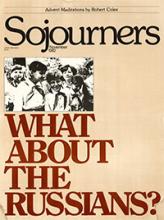On March 14, 1978, Soviet police finally caught up with Vladimir Shelkov, the head of the All-Union Church of True and Free Seventh-Day Adventists. Shelkov had lived in hiding for 10 years until he was arrested at his daughter's home in Tashkent. The police also searched the house and adjoining grounds.
For four days, 12 hours at a time, 20 policemen equipped with guns, walkie-talkies, mine detectors, powerful torches, cameras, axes, crowbars, and spades took the house apart. Floors were split open, doors broken down, walls and ceilings smashed. The police dug six-foot-deep trenches in the yard and under the house and examined the cesspool with the help of magnetic lifting gear and probes.
They found two hiding places in the house and two large holes in the ground, each about six feet high and lined on the inside with plywood. As a result of the search, the police confiscated Bibles, psalm books, tape recordings of psalms, sermons, and broadcasts by the BBC and Voice of America, documents about prisoners, as well as manuscripts, letters, postcards, and photographs.
Before his arrest, Vladimir Shelkov had been constantly persecuted. He had spent 23 years in prison during earlier terms. In 1945 he was sentenced to be shot, but his execution was commuted to 10 years in the camps. He went into hiding in 1969, and until he was taken from his daughter's home in 1978, he managed to live secretly within the Adventist community. At the time of his arrest, Vladimir Shelkov was 83 years old. He was tried, convicted, and sentenced to five years of hard labor.
He did not survive for long. At the end of January, 1980, his wife received a telegram from Tabaga camp, near Yakutsk, informing her of his death.
Article 52 of the Soviet Constitution (1977) states that "citizens of the USSR are guaranteed freedom of conscience, that is, the right to profess or not to profess any religion, and to conduct religious worship or atheistic propaganda."
Read the Full Article

